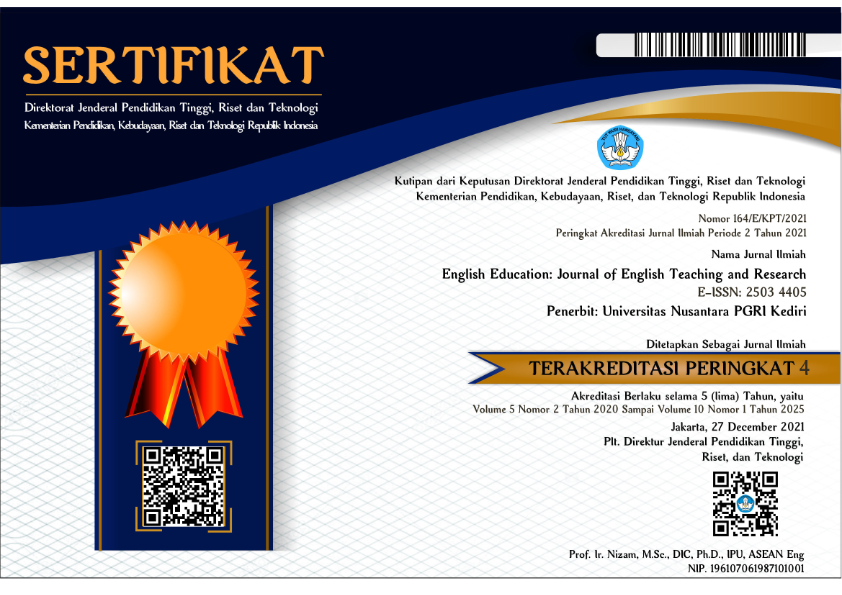Using Whatsapp for Learning to Enhance Students’ Vocabulary Achievement
DOI:
https://doi.org/10.29407/jetar.v9i2.23295Keywords:
WhatsApp; vocabulary; Education technology, WhatsApp, Education technology, EducationAbstract
The aims of research were to know the effectiveness of using WhatsApp to enhance students’ vocabulary achievement, and the challenges faced in implementing this technology. The design of this research followed the PRISMA (Preferred Reporting Items for Systematic Reviews and Meta-Analyses) guidelines to ensure a structured and transparent review process.The inclusion and exclusion criteria were determined in this study.Nineteen of the one hundred chosen articles met the inclusion requirements after further evaluation.The data were synthesized to provide a comprehensive overview of WhatsApp's influence on vocabulary learning. The synthesis highlighted the benefits, challenges, and implications of using WhatsApp in the context of language learning, managing distractions, ensuring material relevance, safeguarding privacy, and employing strategic teaching methods.As WhatsApp offers a platform for individual study outside of the classroom and peer-to-peer immediate feedback, it also encourages students' motivation and involvement in the learning process. The analysis of these results demonstrates that incorporating WhatsApp into the curriculum can create an engaging and dynamic learning environment. However, in order to fully utilize this technology for learning, this study also identified a number of obstacles that must be addressed, including problems with technological access, distractions, and managing study groups.It is clear that WhatsApp has great potential as an effective educational tool in improving EFL students' vocabulary learning. Educational institutions should consider formally integrating WhatsApp into their language learning curriculum and learning activities.
Downloads
References
Allagui, B. (2014). Writing through WhatsApp: an evaluation of students writing performance. International Journal of Mobile Learning and Organisation, 8(3-4), 216-231.
Baishya, D., & Maheshwari, S. (2020). Whatsapp groups in academic context: Exploring the academic uses of whatsapp groups among the students. Contemporary educational technology, 11(1), 31-46.
Bensalem, E. (2018). The impact of WhatsApp on EFL students' vocabulary learning. Arab World English Journal (AWEJ) Volume, 9.
Bouhnik, D., & Deshen, M. (2014). WhatsApp goes to school: Mobile instant messaging between teachers and students. Journal of Information Technology Education. Research, 13, 217.
Çetinkaya, L. (2017). The impact of WhatsApp use on success in education process. International Review of Research in Open and Distributed Learning, 18(7).
Çetinkaya, Ş. E. (2020). Bringing Classroom and Outside World Together: Mobile Instant Messaging via WhatsApp© for Extracurricular Writing. Qualitative Report, 25(12).
Hamad, M. M. (2017). Using WhatsApp to Enhance Students' Learning of English Language" Experience to Share". Higher Education Studies, 7(4), 74-87.
Hashemifardnia, A., Namaziandost, E., & Rahimi Esfahani, F. (2018). The effect of using WhatsApp on Iranian EFL learners’ vocabulary learning. Journal of Applied Linguistics and Language Research, 5(3), 256-267.
Imwa, M. (2020). The potential of using smartphone in teaching and learning in secondary school: a descriptive study of selected schools in Maputo City (Doctoral dissertation).
La Hanisi, A., Risdiany, R., Dwi Utami, Y., & Sulisworo, D. (2018). The use of WhatsApp in collaborative learning to improve English teaching and learning process. International Journal of Research Studies in Educational Technology, 7(1), 29-35.
Madge, C., Breines, M. R., Dalu, M. T. B., Gunter, A., Mittelmeier, J., Prinsloo, P., & Raghuram, P. (2019). WhatsApp use among African international distance education (IDE) students: transferring, translating and transforming educational experiences. Learning, Media and Technology, 44(3), 267-282.
Marques, O. (2016). Innovative technologies in everyday life. Springer International Publishing.
Rambe, P., & Chipunza, C. (2013, August). Using mobile devices to leverage student access to collaboratively-generated resources: A case of WhatsApp instant messaging at a South African University. In 2013 International Conference on Advanced ICT and Education (ICAICTE-13) (pp. 314-320). Atlantis Press.
Suárez-Lantarón, B., Deocano-Ruíz, Y., García-Perales, N., & Castillo-Reche, I. S. (2022). The educational use of WhatsApp. Sustainability, 14(17), 10510.
Ujakpa, M. M., Heukelman, D., Lazarus, V. K., Neiss, P., & Rukanda, G. D. (2018, May). Using WhatsApp to support communication in teaching and learning. In 2018 IST-Africa Week Conference (IST-Africa) (pp. Page-1). IEEE.
Yeboah, J., & Ewur, G. D. (2014). The impact of WhatsApp messenger usage on students performance in Tertiary Institutions in Ghana. Journal of Education and practice, 5(6), 157-164.
Downloads
Published
Issue
Section
License
Authors who publish with this journal agree to the following terms:
- Copyright on any article is retained by the author(s).
- The author grants the journal, the right of first publication with the work simultaneously licensed under a Creative Commons Attribution License that allows others to share the work with an acknowledgment of the work’s authorship and initial publication in this journal.
- Authors are able to enter into separate, additional contractual arrangements for the non-exclusive distribution of the journal’s published version of the work (e.g., post it to an institutional repository or publish it in a book), with an acknowledgment of its initial publication in this journal.
- Authors are permitted and encouraged to post their work online (e.g., in institutional repositories or on their website) prior to and during the submission process, as it can lead to productive exchanges, as well as earlier and greater citation of published work.
- The article and any associated published material is distributed under the Creative Commons Attribution-ShareAlike 4.0 International License








 Article template
Article template



